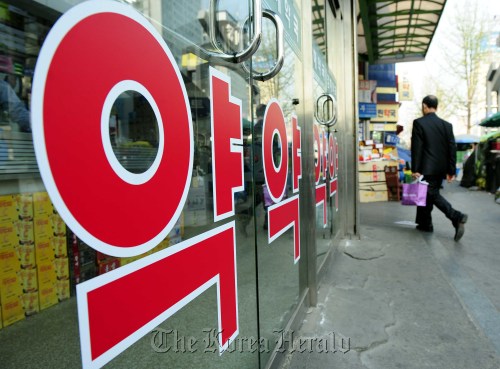Four companies file injunction against 14% discount effective April 1
Pharmaceutical companies and the government are at odds over the new regulation slashing drug prices by an average of 14 percent from April 1.
Four drug makers have filed an injunction and annulment suit against the Ministry of Health and Welfare, claiming it threatens the business environment.
The ministry on Tuesday defended its case at the Seoul Administrative Court over a suit filed by Ilsung Pharmaceuticals, Elyson Pharmaceuticals, Dalim BioTech and KMS Pharmaceutical, saying the discount aimed at saving 1.7 trillion won in medical expenses for the national health insurance fund and others is necessary.
According to the rule, the price of 6,506 drugs listed on the national health insurance beneficiary list will be discounted, including original drugs that have expired patents. They will be priced the same as their generics or sometimes, cheaper. Those exempt are patented or hard-to-cure disease treatments.
The number of subjected products accounts for 47.1 percent of the NHI program coverage.
Pharmaceutical companies and the government are at odds over the new regulation slashing drug prices by an average of 14 percent from April 1.
Four drug makers have filed an injunction and annulment suit against the Ministry of Health and Welfare, claiming it threatens the business environment.
The ministry on Tuesday defended its case at the Seoul Administrative Court over a suit filed by Ilsung Pharmaceuticals, Elyson Pharmaceuticals, Dalim BioTech and KMS Pharmaceutical, saying the discount aimed at saving 1.7 trillion won in medical expenses for the national health insurance fund and others is necessary.
According to the rule, the price of 6,506 drugs listed on the national health insurance beneficiary list will be discounted, including original drugs that have expired patents. They will be priced the same as their generics or sometimes, cheaper. Those exempt are patented or hard-to-cure disease treatments.
The number of subjected products accounts for 47.1 percent of the NHI program coverage.

The ministry stressed that drug prices have been inflated over the past decades, smothered by irregularities such as the illegal rebate practice.
“According to the Fair Trade Commission’s 2007 report, the illegal rebate practice in which pharmaceutical firms offer a certain portion of their sales to chemists or doctors in exchange for the prescription of their products, takes up to 20 percent of the market activities, assumed at 2 trillion won. If the firms could root such irregularities, they may survive well with the discount,” a ministry official explained.
The authorities claim that Korean’s expenditure in drugs is higher than its OECD peers and that many firms have reaped the benefits from the state health insurance program that has secured a substantial amount of additional profits.
“The new program is expected to save the NHI coffer 1.2 trillion won and an additional 500 billion won for ordinary citizens, who have purchased drugs at exceptionally high prices,” the official said.
However, drug makers complain that the rule will inflict astronomical damage to them, especially the mid-to-small sized companies that heavily rely on the sales of generic drugs.
“Once the rule comes into effect, the price of original drugs will go down to our level. In that case, doctors and patients will be more likely to choose the original ones over ours,” said a spokesman for a small firm that sells hypertension medications.
A doctor agreed.
“Treatment for chronic illnesses such as hypertension requires a large sum of money, so we usually prescribe generics though we personally prefer the original. Once the price becomes equal, we may switch to originals,” he said.
Korea Investment & Securities predicted that the regulation will slow down the industry growth rate and halve profits instantly.
The companies have started restructuring in fear that the sales loss could breakdown their balance sheets. Industry observers said the new program could make up to 136,000 people redundant.
According to local reports, Sanofi Aventis, a France-based multinational firm, has recently unfolded its early retirement program while Samil, one of the industry powerhouses, has also decided to let 100 executive-level employees go. Some other companies have also discussed with their labor unions about a possible wage freeze and layoffs, facing harsh criticism.
The Korea Chamber of Commerce and Industry has requested the ministry slow its “reform” pace and prevent drastic changes.
However, the ministry stands firm.
Health and Welfare Minister Rim Chai-min said the price reduction is the key in setting sustainability in the market.
“The plan is not a scheme to impoverish drug firms. Koreans’ medical expenses on drugs have been excessive. It needs to change. The national health insurance fund is at risk of depletion. If it depletes, the firms will be in danger, too. The change is essential for the long run of the industry, too,” he said in a luncheon with KORCHAM members.
He said the lawsuit seems inevitable. To counter the four companies armed with Bae, Kim & Lee as well as other high-profile law firms, the authorities have appointed Logos and Woomyon, other experienced firms. “I am sure things will be settled well in the end,” Rim said.
The administration has also adopted a “carrot and stick” policy, scrutinizing companies with illegal business transactions, but promising to select 50 companies as “innovative pharmaceuticals,” subject to tax deduction, price raises, financial aid, research and development support and among other benefits.
“Large pharmaceutical firms have been vying to be designated as an innovative firms. They think it is more profitable. That’s why large drug makers have refrained from suing the ministry. In any case, turning your back against the government will do no good,” an insider at a large domestic producer said.
“Because large companies have washed their hands of the possible litigation, the pharmaceutical industry lost its power in its battle against the government. The firms will loose eventually,” he added.
By Bae Ji-sook (baejisook@heraldcorp.com)
-
Articles by Korea Herald








![[KH Explains] How should Korea adjust its trade defenses against Chinese EVs?](http://res.heraldm.com/phpwas/restmb_idxmake.php?idx=644&simg=/content/image/2024/04/15/20240415050562_0.jpg&u=20240415144419)











![[Today’s K-pop] Stray Kids to return soon: report](http://res.heraldm.com/phpwas/restmb_idxmake.php?idx=642&simg=/content/image/2024/04/16/20240416050713_0.jpg&u=)